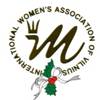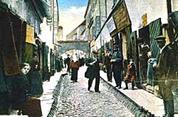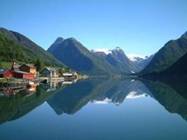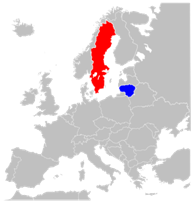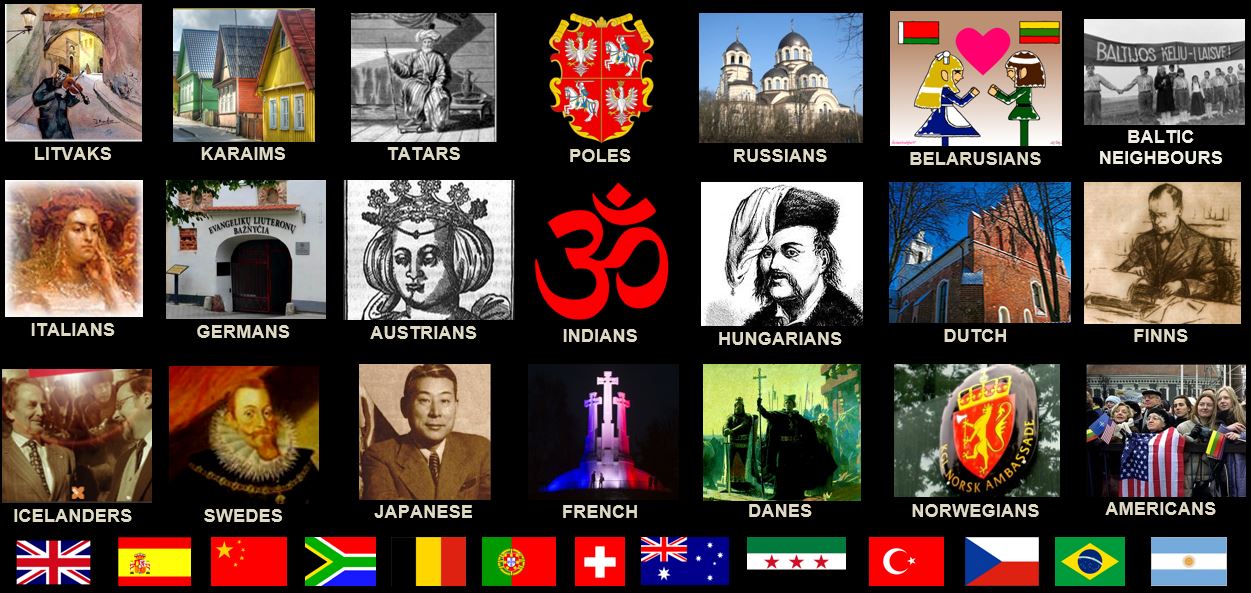

THE VOICE OF INTERNATIONAL LITHUANIA
|
VilNews has its own Google archive! Type a word in the above search box to find any article.
You can also follow us on Facebook. We have two different pages. Click to open and join.
|
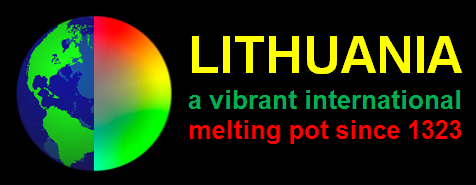
Lido Marine – a Norwegian success story in Klaipėda
Sat, 18th August, 2012 - Posted by - (3) Comment
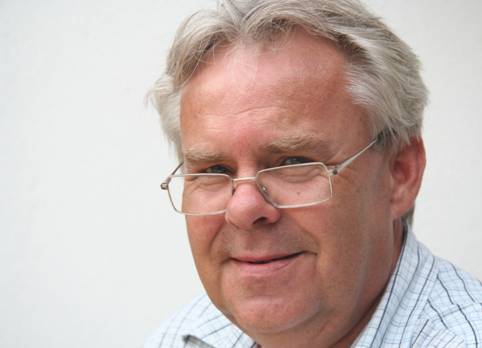
Norwegian Gunnvald Laukhammer, the main person behind the success of Lido Marine,
is not exactly thrilled with the way the Lithuanian authorities often are acting.
LIDO Marine is a Norwegian owned Lithuanian company, established originally under the name Lauremija in 2002, with roots in the maritime business back to 1977 and as own firms since 1986. The company's founder and general director, Gunnvald Laukhammer, has long experience in building and contracting, ship interior outfitting, industrial insulation and ventilation systems in the Norwegian onshore and offshore industry.
By basing the company in the port city of Klaipeda, LIDO Marine has been able to take advantage of the wealth of experience in the ship building industry of the city. During post-war soviet times, Klaipeda was one of the major centres of ship repair and ship building for the Soviet shipping industry. Four major ship building yards and numerous related businesses operated in the city; even today Klaipeda is host to 43 ship-repair, building and technical services companies.
In 2006 the company also bought facilities in Kretinga, a town not far from Klaipeda, and established Baltic Marine Furniture to produce furniture and interiors to supply the mother company’s ship and offshore fitting operations.
LIDO Marine currently has a staff of around 75, mostly Lithuanians divided into teams of 5 to 30 people, who travel all over Europe (sometimes also in other parts of the world) to furnish ships and offshore platforms. Baltic Marine Furniture employs twelve persons at the factory in Kretinga.
The authorities do nothing to facilitate or help us
Gunnvald Laukhammer is not exactly thrilled with the way the Lithuanian authorities often are acting. "Sometimes I feel they are more eager to create problems than to help out," he says. "Take as an example that our company Baltic Marine Furniture now for a long period of time has tried to get permission to extend the furniture workshop building in Kretinga. But instead of welcoming new jobs and investments with open arms, the local authorities seem to do what they can to thwart us, and we still have not received a building permit for a rather simple building extension, on our own land, after about two years of waiting. Now another winter may come before we can start building," he says.
Gunnvald is not overexcited when he talks about the many bureaucrats and politicians he thinks Lithuania has too many of.
"I simply no longer allow myself to get annoyed at how poorly the systems in this country often works," he says in his laconic, Western-Norwegian, manner.
"It is, however, strange to see," he says, "that an investor and export company like ours is getting no support or help from the local Lithuanian authorities. I feel, on the contrary, that they sometimes are attempting to cheat and take unfair advantage of us and other foreign companies here."
- Bookmark :
- Digg
- del.icio.us
- Stumbleupon
- Redit it
Thu, 16th August, 2012 - Posted by - (2) Comment
JAMES ANDREW CLARKE:
Irish horse farmer who succeeded in real estate and settled in Klaipėda
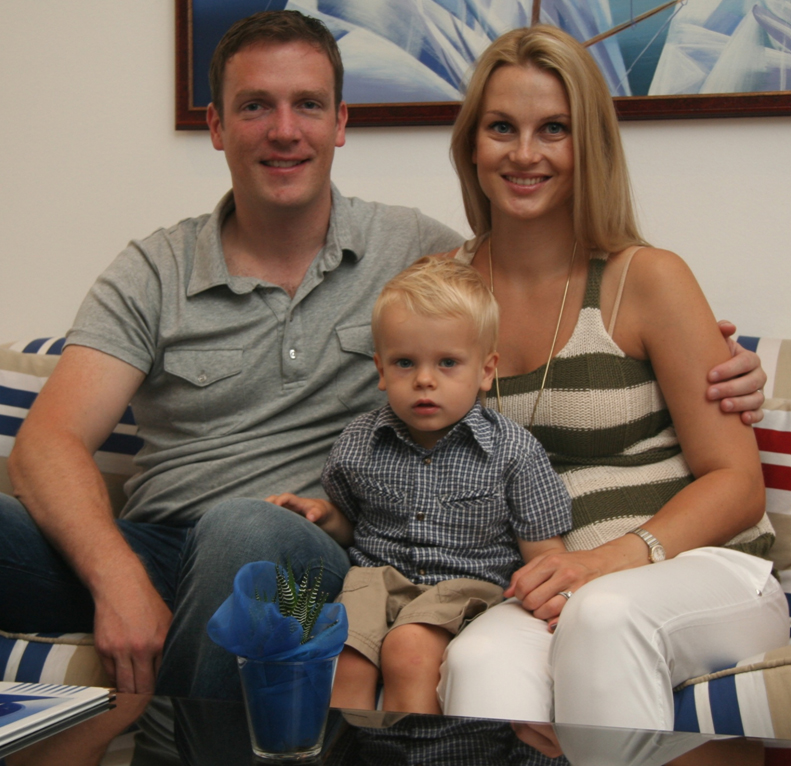
James A. Clarke (34) with wife Marina (27) and son Daniel (2).
It is a very likeable couple sitting in the sofa in front of me here in the Radisson Blu Klaipeda this Saturday morning. Young, smart, successful people who have chosen Klaipeda as their hometown and base for the business activities, James has built up here over the last few years. Their two-year-old son Daniel is running around, full of energy. Luckily I manage to snap a quick family photo the one second he sits quietly with his parents.
James was only 21 years old when he came to Klaipeda and Lithuania for the first time. The building engineer who had grown up in an Irish family farm had come here to buy horses on behalf of his uncle, Ireland's largest horse-farmer.
Something out here at the Lithuanian coast must have caught James' interest and curiosity even then, so after having travelled around and seen more of the world, he came back here in 2003. And now the business got serious.
That very same year, BNTP (Baltic Real-Estate Developments) was established in Klaipeda, where it successfully developed the first modern business park in Lithuania - Klaipeda Business Park. Since then BNTP has expanded its portfolio through developments and acquisitions to include commercial centres and land plots in Lithuania and Latvia.
James has been very active and successful in his real estate endeavours since the start-up eight years ago.
- Bookmark :
- Digg
- del.icio.us
- Stumbleupon
- Redit it
Wed, 15th August, 2012 - Posted by - (3) Comment
Next time you eat bacalao* in Spain or Italy
* The word bacalao is Spanish, and simply means cod. Actually, in many Latin countries like Brazil, Italy, Greece and of course Spain, the term bacalao is used for stockfish or salted cod. In Portugal, bacalao is said to be prepared in at least 365 different ways – one for each day of the year.

Reidar Inselseth is General Director of the Espersen fish factory in the Klaipeda Free Economic Zone, where cod from the Baltic Sea and Arctic Ocean is converted to delicious fish fillets for southern European markets.

- Bookmark :
- Digg
- del.icio.us
- Stumbleupon
- Redit it
Californian Rotarians visiting Lithuania
Sun, 12th August, 2012 - Posted by - (2) Comment
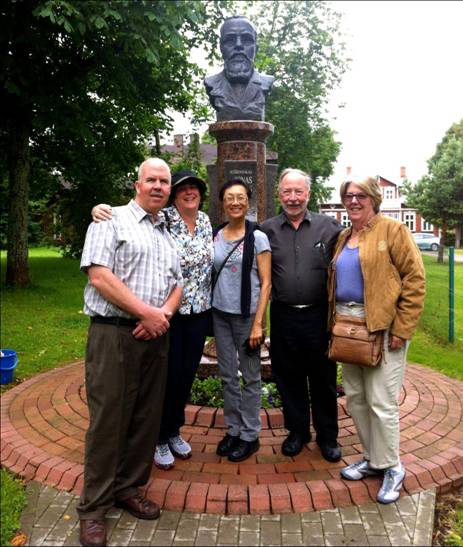
Report written by Millbrae CA Rotarian Walter Gladwin,
Millbrae Rotarians, California
The basic purpose of this trip was to visit our Rotary Club’s Sister City Club in Siauliai Lithuania, visit the Auksuciai Farm that our club has been supporting for several years, visit two Museums in Lithuania that have items donated by the Sliupas family (Vytas Sliupas is a member of our Millbrae California Rotary club).
Eventually five of us started this adventure, Denis & Marciana O’Halloran, Deirdri & Walt Gladwin and Shirley Kwok. We all planned on getting to Lithuania on July 1.
- Bookmark :
- Digg
- del.icio.us
- Stumbleupon
- Redit it
Sat, 2nd June, 2012 - Posted by - (1) Comment

SOUTH AFRICAN EMBASSY
Wathint' abafazi, wathint'
imbokodo; uzokufa!
(If you strike a woman you strike a rock, and you will die!)
A saying from South Africa during the darkest days of the nation’s oppression.

Ambassador of South Africa to Denmark and Lithuania,
H.E., Ms. Samkelisiwe I. Mhlanga
Speech by Ambassador of South Africa to Denmark and Lithuania, Samkelisiwe I. Mhlanga, at the soon-to-open Crisis Centre for Women in Klaipeda
I would like to thank you for the honour of allowing us to pay a short visit to this inspiring centre you are establishing here in Klaipeda. I would like to commend the community leaders of Klaipeda for your insight and your hard work and I would like to wish you well with all your future planning and efforts. I would also like to express my admiration to the employees of the centre. These are the people who accepted the calling to fight abuse every day of their lives. Ladies and Gentleman, we admire you.
As South African’s we are humbled to be here, as the life stories we have heard and witnessed today in this place, cannot but remind us of the hardships and suffering of the women of our own country. It should also remind us that no nation on earth should claim to be completely free if the vulnerable members of its society continue to suffer abuse, injustice and discrimination.
Ladies and Gentlemen, I come from a continent whose history is filled with colonialisation and oppression that brought with it unmentionable hardship. I come from a country where a racist regime governed for 5 decades and passed laws that kept a country in bondage and cost the lives of thousands of its citizens.
In general, all racial and ethnic groups in South Africa have long-standing beliefs concerning gender roles, and most are based on the premise that women are less important, or less deserving of power, than men. Most African traditional social organizations are male centered and male dominated. Even today, in some rural areas of South Africa, for example, wives walk a few paces behind their husbands in keeping with traditional practices.
But Ladies and Gentlemen, things are changing in my country. Twentieth-century economic and political developments presented South African women with both new obstacles and new opportunities to wield influence.

Ambassador Samkelisiwe I. Mhlanga and Political Councellor Douw GJ Vermaak from the South African Embassy in Copenhagen were at the soon-to-open Crisis Centre for Women in Klaipeda last week, Here discussing the topic of violence against women with Klaipeda’s Mayor, Vytautas Grubliauskas (left)
and the staff of the Municipality’s social department.
- Bookmark :
- Digg
- del.icio.us
- Stumbleupon
- Redit it
Lithuania has a proud 700-year history as home to numerous nationalities
Wed, 11th April, 2012 - Posted by - (8) Comment
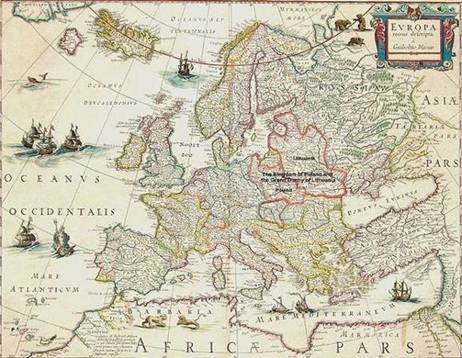
Text: Aage Myhre
International Lithuania got its “flying start” already in 1323, when Grand Duke Gediminas founded Vilnius as Lithuania’s capital city, and immediately decided to invite merchants, craftsmen, bankers, farmers, and soldiers from all Europe to come to the new capital, guaranteeing all freedom of beliefs and good working conditions. Vilnius became international, though with less of German or Scandinavian influence, as one could expect, rather influenced by Rome – greatly different from the other two Baltic capitals.
- Bookmark :
- Digg
- del.icio.us
- Stumbleupon
- Redit it
Thu, 5th April, 2012 - Posted by - (1) Comment
VIC
VILNIUS INTERNATIONAL CLUB
New board for
Vilnius International Club

Web page for VIC: http://vilnius-international-club.com/
- Bookmark :
- Digg
- del.icio.us
- Stumbleupon
- Redit it
Lietuva is the best country in all the world for four reasons:
Sun, 12th February, 2012 - Posted by - (3) Comment

Labas Aage Myhre,
I learned of your website through the British-Lithuanian Society, of which I have been a sustaining member for four years. The B-LS does a wonderful job of promoting Lithuanian social and cultural events in the United Kingdom, and helps to promote initiatives in Lietuva through The Tiltas Trust, a registered charity. For details, go to www.britishlithuaniansociety.org.uk.
I am very proud to tell you that the best man I ever knew was my maternal grandfather, who was Lithuanian. The spelling of the family name changes from document to document, but his father's surname was Markauskus (Markowskas? Markauskus?) and his mother's maiden name was Janusraitus (again, different spellings). There is NOTHING that would make me happier than to be able to trace my roots within Lietuva. If you - or anyone you know - can help me, I would be most grateful. Do you know which part of the country people with these names came from originally? You don't know how much this means to me.
- Bookmark :
- Digg
- del.icio.us
- Stumbleupon
- Redit it
Fri, 18th November, 2011 - Posted by - (1) Comment
Mark your calendars:
The Christmas Charity Bazaar will take place on Saturday 3 December!
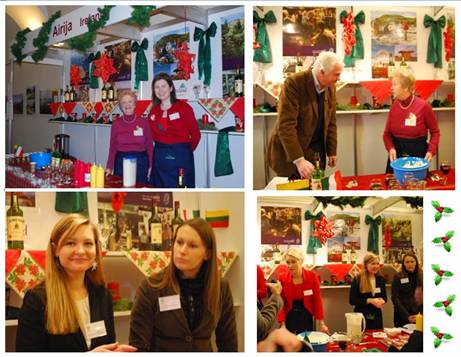
‘Team Ireland’ at last year’s bazaar.
The 9th International Christmas Charity Bazaar (ICCB) will take place on Saturday, 3 December, 2011 at the Vilnius Town Hall (Rotuše) under the kind patronage of Mrs Alma Adamkiene. The Bazaar, organised by the International Women’s Association of Vilnius (IWAV) in cooperation with the international diplomatic and business communities and Lithuanian friends, has become the unofficial start to the Christmas season.
The 2010 event was attended by more than 5.000 visitors and raised nearly 300.000 Litas for beneficiaries, including: Kaunas Medical University Clinic, Vilnius Residential Home for Children and Youth, Ekklesia Charity Foundation, Vilnius University Children's Oncology Unit, Kijeliu Home for Severely Disabled Children (specialusis ugdymo centras), Alantos Nursing Home for the Elderly, Children-Youth Day Care Centre “Musu Namelai”, and the Training Centre for the Blind and Visually Impaired. More information is available from: www.iwavilnius.com/iccb.
- Bookmark :
- Digg
- del.icio.us
- Stumbleupon
- Redit it
Christmas Charity Bazaar background
Fri, 18th November, 2011 - Posted by - (1) Comment
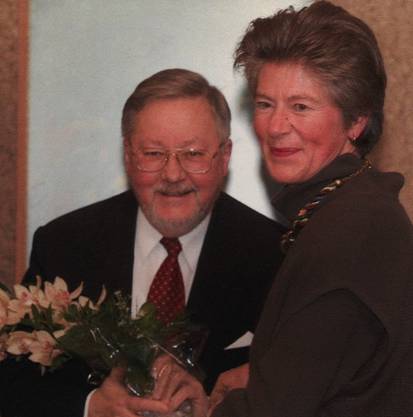
Gunilla Possenius with Professor Vytautas Landsbergis.
By: Gunilla Possenius
Vilnius´ International Christmas Charity Bazaar is approaching - but how and when did it start?
For the ninth year Vilniaus Rotuse will open its doors for the International Christmas Charity Bazaar (ICCB) on December 3. This annual event has become one of the true signs that Christmas is approaching.
But how many know today how it all really started? Over the years, inaccurate information regarding how ICCB started was circulating. So now it is time for the true story to be told.
- Bookmark :
- Digg
- del.icio.us
- Stumbleupon
- Redit it
Sun, 6th November, 2011 - Posted by - (1) Comment
How I came to Lithuania 21 years ago
Some private memories by Aage Myhre, VilNews Editor-in-Chief
aage.myhre@VilNews.com
1. Summer of 1990:
Landsbergis to Norway
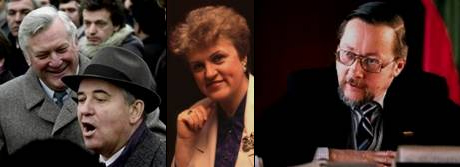
![]()
2. November 1990:
A Volga journey from Riga

![]()
3. Nov 1990: Oil, a girl and
a satellite system


![]()
4. January 1991:
Soviet rolls back

![]()
January 1991:
5. With Landsbergis behind barbed wire and homemade barricades
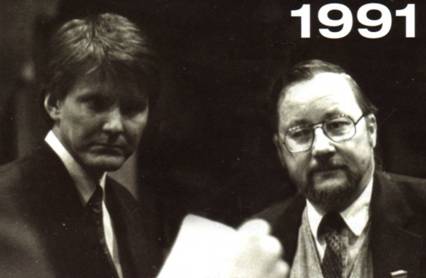
![]()
6. 1991: Oslo and Vilnius
become twin cities

- Bookmark :
- Digg
- del.icio.us
- Stumbleupon
- Redit it
Thu, 13th October, 2011 - Posted by - (1) Comment



Above: Signatures by VIC’s initial ‘working group’
in October 2001, 10 years ago.
Visit the VIC web page:
http://vilnius-international-club.com/
Vilnius International Club (VIC) has since October 2001* been a leading club and a dynamic meeting point for local people with international interests and for expatriates from many countries. The club’s mission is to support and encourage the cultural, historic, and economic vitality of Vilnius as a capital city and of Lithuania as an outstanding historic and contemporary scene for interaction and constructive activities between fine people from many countries. Men and women from the expatriate and Lithuanian communities, working in diplomatic, business, and cultural spheres, fulfil VIC’s mission through fellowship, monthly meetings, and occasional charitable programmes.
*VIC started its activities in October 2001, and was formally established in February 2002.
***************************************************************************************************
Opinions about VIC over the years
VIC has built a new bridge...
VIC is a refreshing initiative that has built a new bridge between local Lithuanians and foreigners in Vilnius. The success of the Club is a result of good balance between many different nationalities and great variety of cultural and social activities. It is important to maintain high share of Lithuanians in VIC as expatriates do not need a club to meet foreigners..
- Bjarne-Espen Christiansen, Manager of Scandinavian Airlines (Denmark)
The VIC format is very unique...
I think VIC format is very unique. It encompasses many features that many other clubs/organizations, between which we share our off-duty time, lack. It has planned events schedule, as well as beautiful ad-hoc social surprises; and, most importantly, diversity of people and themes.
- Vygandas Juras, Partner of Baltcap Management (Lithuania)
Potential to integrate Vilnius community into modern Europe...
It is a creative organisation with huge potential to integrate Vilnius community into modern Europe.
- Daiva Vitkute, Managing Director, Vilnius Consult (Lithuania)
I am extremely grateful for Vilnius International Club actions...
I am extremely grateful for Vilnius International Club actions enhancing cultural, historical and economic life in our city. I am also thankful for charity programs set for unprivileged inhabitants of the city. The variety of activities you accomplish in the city contributes to the philanthropic movement development as well as assists with the implementation of tangible social projects in Vilnius...
- The Mayor of Vilnius City Municipality, Arturas Zuokas
- Bookmark :
- Digg
- del.icio.us
- Stumbleupon
- Redit it
Thu, 29th September, 2011 - Posted by - (2) Comment
VilNews had 100.000 visits in 6 months!
VilNews has been online for a little over six months now. When we started, our goal was to reach 100 000 visits in ONE year. Experts thought we were kidding. The fact is that we reached the target in just six months!
Thanks to you, dear readers!
Among the things we're going to focus on this autumn and winter, is to tell you more about this nation's relations with other countries around the world. For better or worse. Open, forthright talks will still be our standards.
Please write us with your ideas and comments!
The illustrations below show some characteristics of the nations we will cover, things that make them known here, presented in Lithuania’s flag colours.
 ARTICLE NO. 1 HUNGARY |
 ARTICLE NO. 2: ITALY |
 ARTICLE NO. 3: KARAIMS |
|
 ARTICLE NO. 4: DENMARK |
 ARTICLE NO. 5: JAPAN |
 ARTICLE NO. 6: CANADA |
|
 ARTICLE NO. 7: ARTICLE NO. 7:GERMANY |
 ARTICLE NO. 8: CHINA |
 ARTICLE NO. 9: INDIA |
|
 ARTICLE NO. 10: SWEDEN |
 ARTICLE NO. 11: TATARS |
 ARTICLE NO. 12: USA |
|
 ARTICLE NO. 13: RUSSIA |
 ARTICLE NO. 14: BELARUS |
 ARTICLE NO. 15: ICELAND |
|
 ARTICLE NO. 16: TURKEY |
|
 ARTICLE NO. 18: THE UK |
|
 ARTICLE NO. 19: NORWAY |
 ARTICLE NO. 20: POLAND |
 ARTICLE NO. 21: FRANCE |
|
|
|
ARTICLE NO. 22: THE LITVAKS (LITHUANIAN JEWS) |
||
Lithuania has an amazing 700-year history as an international melting pot. This has been especially evident since 1323, the year Grand Duke Gediminas founded Vilnius as Lithuania’s capital city and immediately decided to invite merchants, craftsmen, bankers, farmers, and soldiers from all Europe to come to the new capital, guaranteeing all freedom of beliefs and good working conditions. Vilnius became international, though with less of German or Scandinavian influence, as one could expect, rather influenced by Italy and Mediterranean ideas – greatly different from the other two Baltic capitals where Hanseatic influence became dominant.
VilNews will over some time this autumn publish articles about impacts of foreign nations and cultures here. We also welcome you, dear readers, to share with us information you may have about ‘foreign footprints in Lithuania’.
- Bookmark :
- Digg
- del.icio.us
- Stumbleupon
- Redit it
Mon, 12th September, 2011 - Posted by - (4) Comment

Lithuania has an amazing 700-year history as an international melting pot. This has been especially evident since 1323, the year Grand Duke Gediminas founded Vilnius as Lithuania’s capital city and immediately decided to invite merchants, craftsmen, bankers, farmers, and soldiers from all Europe to come to the new capital, guaranteeing all freedom of beliefs and good working conditions. Vilnius became international, though with less of German or Scandinavian influence, as one could expect, rather influenced by Italy and Mediterranean ideas – greatly different from the other two Baltic capitals where Hanseatic influence became dominant.
VilNews will over some time this autumn publish articles about impacts of foreign nations and cultures here. We also welcome you, dear readers, to share with us information you may have about ‘foreign footprints in Lithuania’.
THE DANES AND THE BALTS
A thousand years of coexistence

Danish sugar produced in Lithuania.
Text: Kaare E. Janson
From the time of the Vikings, more than a 1000 years ago, the neighbouring Baltic Sea and the various ethnic tribes that lived about its shores attracted the interest of the seafaring Danes. In due course trade with these tribes began. But it was a bellicose time when stronger nations sought to extend their domains by conquest. These pagan tribes possessed great forests and to lay claim to them the Danes fought the Germans, the Swedes, the Finns, the Russians, the Estonians, the Latvians, the Prussians, and the Poles - but never the Lithuanians. In fact, after Europe recognized Lithuania as an independent state and even later, when it formed a union with Poland, Lithuania and Denmark from time to time formed alliances to defend themselves from their common foes – the Germans, the Swedes, and the Russians.
- Bookmark :
- Digg
- del.icio.us
- Stumbleupon
- Redit it
Thu, 8th September, 2011 - Posted by - (4) Comment
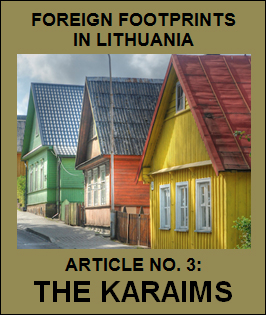
Lithuania has an amazing 700-year history as an international melting pot. This has been especially evident since 1323, the year Grand Duke Gediminas founded Vilnius as Lithuania’s capital city and immediately decided to invite merchants, craftsmen, bankers, farmers, and soldiers from all Europe to come to the new capital, guaranteeing all freedom of beliefs and good working conditions. Vilnius became international, though with less of German or Scandinavian influence, as one could expect, rather influenced by Italy and Mediterranean ideas – greatly different from the other two Baltic capitals where Hanseatic influence became dominant.
VilNews will over some time this autumn publish articles about impacts of foreign nations and cultures here. We also welcome you, dear readers, to share with us information you may have about ‘foreign footprints in Lithuania’.
Karaims – Turkic tribe that found a new home in Lithuania
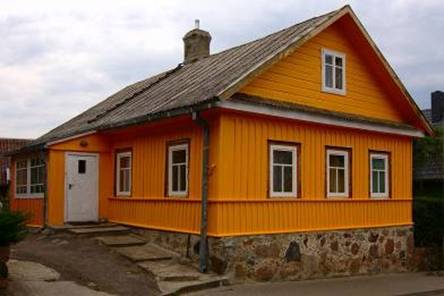
Karaim house in Trakai, 30 km from Vilnius.
The Karaims represent the smallest ethnic group in Lithuania, inextricably linked with the Crimean victories of Grand Duke Vytautas who brought 380 Karaim families to his castle in Trakai back in the 1390s.
During the 600 years that they have lived in Lithuania, this small Turkic people have preserved a strong national consciousness. A rather inward-looking community life, firm moral principles based on the teachings of the Karaim religion, and steadfast adherence to tradition - all these things have contributed to the survival of the people, of their basic characteristics, such as language, customs, and rituals, and thus, of their national identity. What also helped the Karaims of Lithuania survive under difficult conditions was the tolerance and respect for them expressed during all those centuries not only in the everyday contacts between people but also in the official state documents of various periods.
An exceptional period in the history of Lithuanian Karaims was the Soviet occupation, which thoroughly shook up the accustomed foundations of Karaim community life. The consequences of that time, which are still felt today, make it much more difficult for people to "return to their roots," to the rhythms of their national life.
Many world scholars are interested in the cultural heritage that Lithuanian Karaims have preserved to the present day. The still living Karaim language, which belongs to the West Kipchak subgroup of the Turkic family of languages, receives the most attention. It is being studied from several angles - as a language that has preserved rare old forms and words that have disappeared from other languages of the Turkic family and also as one that has borrowed and in its own way adapted some features of vocabulary and syntax from neighbouring languages (Lithuanian, Russian, and Polish).
- Bookmark :
- Digg
- del.icio.us
- Stumbleupon
- Redit it
Fri, 12th August, 2011 - Posted by - (2) Comment
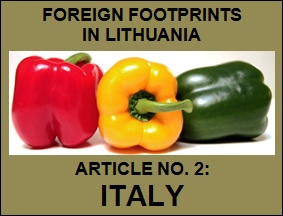
Lithuania, once Europe's largest nation, has an amazing 700-year history as an international melting pot. This became especially evident after 1323, the year Grand Duke Gediminas founded Vilnius as Lithuania's capital city and immediately decided to invite merchants, craftsmen, bankers, farmers, and soldiers from all Europe to come to the new capital; guaranteeing all freedom of beliefs and good working conditions. Vilnius became international, though with less of German or Scandinavian influence, as one could expect, rather influenced by Italy and Mediterranean ideas – greatly different from the other two Baltic capitals where Hanseatic influence became dominant.
VilNews will in some upcoming issues publish articles about impacts of foreign nations and cultures here. We also welcome you, dear readers, to share with us information you may have about 'foreign footprints in Lithuania'.
Amazing Italian influence
on Lithuania since 1323

The Royal Palace in Vilnius is now being rebuilt, more or less as one expects it to have looked like in the 1500s during the rule of Grand Duke Sigismund the Old (1467-1548), his wife, Italian Bona Sforza (1494-1557) and their son, Grand Duke Sigismund Augustus (1520-1572).
Text: Aage Myhre
aage.myhre@VilNews.com
While working with the restoration of Vilnius Old Town in the 1990s – as an architect – I often got to hear that this and that building was originally designed by Italian architects. I tried to find out more, but the information I got was very fragmented, so in the early 2000s I started collecting the pieces myself, putting together my own historical survey of the Italian – Lithuanian relationship since 1323. I found that Vilnius by some was known as 'The world's most Italian city outside Italy' and 'Europe's most Baroque city north of the Alps'. I also found the fascinating stories of how Vilnius was regarded one of the world's leading Renaissance cities, competing with Milan and Florence. I even went to Italy myself to find traces, and was truly amazed, not least while learning about the princess of Milan and Bari who became Lithuania's Grand Duchess. The exceptional relationship between Italy and Lithuania, which was especially evident for the period of 1300 – 1800, will never come back, but will always remain as a remarkable memory, and leave its unique hallmarks in and on Lithuania forever.
1300 – 1400:
Grand Duke Gediminas founds Vilnius and writes to the Pope

It is a myth that Rome and Vilnius both were founded by wolves, but...
1400 – 1500:
Gothic Style, symbolized by the
world famous St. Anne Church

St. Anne Church, Vilnius.
1500 – 1600:
Vilnius becomes a Renaissance capital,
competing with Milan and Florence

Vilnius University and the Church of Sts. Johns'
(the church's freestanding bell tower to the right).
1600 – 1700:
Vilnius silhouette turns Baroque
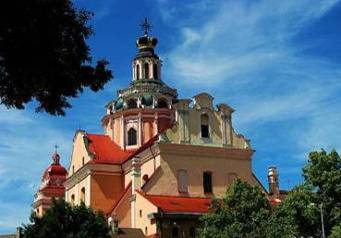
The Church of St. Casimir in the centre of Vilnius.
1700 – 1800:
The Italian sculptures on the Vilnius Cathedral

Vilnius Cathedral.
1800 – 1900:
St. Peter and St. Paul Church gets its final Italian touch

St. Peter and St. Paul Church interior.
1900 – 2011:
Italian pizza, technology and fashion invade Lithuania

LEFT: The Italian transport aircraft C-27J, used by the Lithuanian Armed Forces.
RIGHT: A Maserati Quattroporte recently spotted in Vilnius.
- Bookmark :
- Digg
- del.icio.us
- Stumbleupon
- Redit it
VilNews e-magazine is published in Vilnius, Lithuania. Editor-in-Chief: Mr. Aage Myhre. Inquires to the editors: editor@VilNews.com.
Code of Ethics: See Section 2 – about VilNews. VilNews is not responsible for content on external links/web pages.
HOW TO ADVERTISE IN VILNEWS.
All content is copyrighted © 2011. UAB ‘VilNews’.

 Click on the buttons to open and read each of VilNews' 18 sub-sections
Click on the buttons to open and read each of VilNews' 18 sub-sections 

